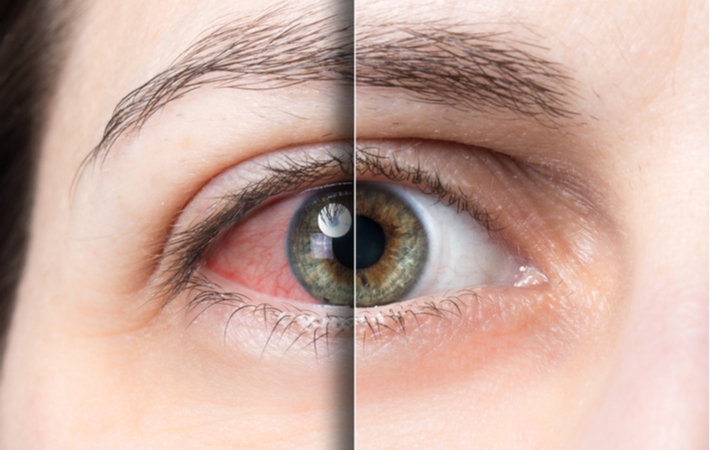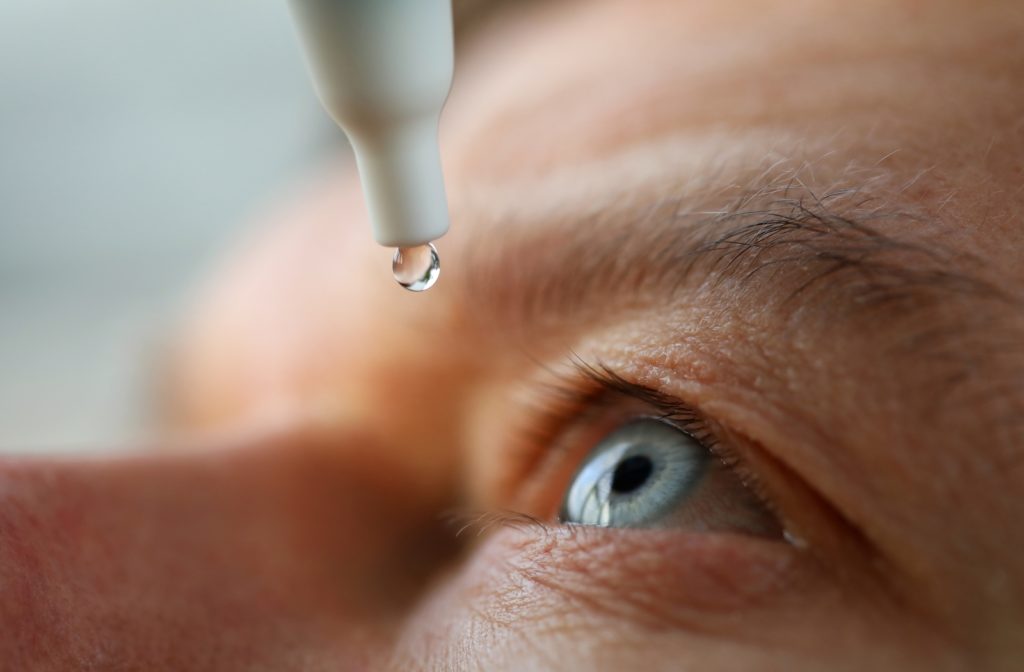Sometimes it can be easy to forget when you last purchased over-the-counter eye drops or updated your prescription eye drops. It may be tempting to ignore the expiration date on the bottle, but eye drops should not be used past their expiration date.
If you’ve accidentally used expired eye drops, you should:
- Use lukewarm water to flush your eyes
- Blink repeatedly while you flush your eyes
- Do not continue to use the eye drops
- Contact your eye doctor
Discover Eyecare is committed to helping you find relief from dry eyes through the use of prescription and over-the-counter eye drops.
Book an appointment for a dry eye evaluation to see if you need prescription eye drops to subside feelings of irritation and itchiness. If you have any concerns or questions, our knowledgeable staff is always happy to help you find the information you are looking for.
Do Eye Drops Expire?
The short answer is yes, eye drops do expire. Expiration dates can vary depending on the brand or type of eye drop, as well as the presence of preservatives. It is vital to follow the exact usage guidelines outlined by the manufacturer and your optometrist in order to ensure safe and effective treatment, and reduce the risk of contamination.
How Long Can You Use Prescription Eye Drops?
Unless it is otherwise stated by your eye doctor or noted on your prescription, eye drops should be safe and effective until the expiration date if they are used and stored properly. Once the sterile seal of the bottle is broken, you will want to be aware that it can become contaminated, especially if the tip of the bottle comes into contact with your eye or another surface. Many eye drops contain preservatives so the growth of bacteria in the product can be slowed — these preservatives should prevent contamination until the expiration date of the eye drops.
Some eye drops are different and should be discarded after a specific number of days after opening. Preservative-free eye drops that come in individual vials have a much higher risk for contamination since there is no added protection against bacterial growth. These kinds of eye drops should be thrown away 24 hours after opening.
Other types of eye drops may contain preservatives but will expire quicker once they have been opened. An expiration date denotes how long medication is expected to stay effective and free from contamination. Thoroughly check these kinds of eye drops’ instructions and look for clearly marked expiration dates before opening the bottle. If you are ever unsure about how long you can use your eye drops, ask your eye doctor for clarification.
It is also important to properly store your eye drops and follow the directions listed on the bottle or package. Some drops are supposed to be stored at room temperature while others may need refrigeration — storage instructions also may be different once the bottle has been opened. If the drops are not stored correctly, they may no longer be effective or safe to use and will have to be thrown away.
Restasis
Restasis is a prescription medication that helps you make more of your own real tears. Restasis eye drops come in single-use vials — if you prefer your eye drops in a bottle, Restasis MultiDose is a great option. It’s the same preservative-free Restasis formulation in a patented bottle design.
Compared to Restasis single-use vials, Restasis MultiDose is more compact and uses less plastic in packaging. Restasis and Restasis MultiDose help increase your eyes’ natural ability to produce tears, which can be reduced by inflammation due to dry eye disease. The US Food and Drug Administration (FDA) recommends stopping the use of eye drops if they have expired, as they may not provide the treatment you need. Consult with your eye doctor for more specific advice.
If you are using Restasis single-use vials, throw them away after 24 hours of being open — they may become contaminated after that period of time and will be unsafe to use.
Xiidra
Xiidra is a prescription eye drop that is used to treat dry eye disease. Xiidra targets specific sources of inflammation that can cause dry eye disease. It can provide lasting symptom relief in some patients with continued twice-daily use. In clinical studies, Xiidra was shown to, on average:
- Reduce symptoms of eye dryness at 12 and 6 weeks
- Provide relief for some patients in as little as 2 weeks
- Reduce signs of dry eye by week 12 in some patients
Xiidra eye drops are contained in single-use vials and should be disposed of after 24 hours of being opened.

I Put Expired Eye Drops in My Eyes, Now What?
Using expired eye drops can lead to irritation, inflammation, or infection. If you have mistakenly used expired eye drops, try following these steps:
- Flush your eyes with lukewarm water
- Blink repeatedly
- Refrain from further use of the eye drops
- Contact your eye doctor
Your optometrist can assess the situation and provide appropriate guidance to alleviate any potential complications. Remember, using expired eye drops may reduce their effectiveness and cause irritation, so it is advisable to discard expired medications and always check the expiration dates before using any eye drops.
Treating Dry Eyes With Lubricating Eye Drops
Lubricating eye drops, or artificial tears, work by adding some of the same elements that your tears naturally have. These eye drops help your tear film in the process of protecting the surface of your eyes and avoiding dry eyes.
Lubricating eye drops can be purchased without a prescription — there are many different brands to choose from, but it is important to consider that no single brand works best for all types of dry eye.
Find Relief From Dry Eyes at Discover Eyecare
If you have expired eye drops, visit Discover Eyecare to either renew your prescription or have a conversation with one of our eye doctors about the best over-the-counter options for your needs. You can also find relief from dry eyes by contacting us and scheduling a dry eye evaluation.



